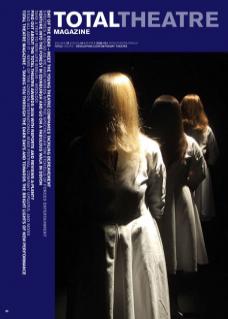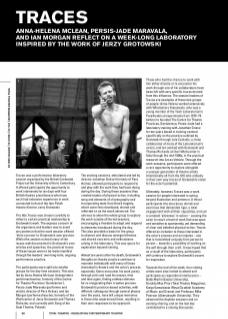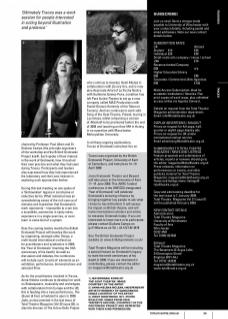Traces was a performance laboratory session organised by the British Grotowski Project at the University of Kent, Canterbury. It offered participants the opportunity to work intensively for six days with four British theatre practitioners who have each had extensive experience in work connected to that of the late Polish theatre director Jerzy Grotowski.
The title Traces was chosen carefully to reflect a certain practical relationship to Grotowski’s work. The express concern of the organisers and leaders was to avoid any pretence that the work session offered ‘direct access’ to Grotowski’s own practice. Whilst the session echoed many of the issues well documented in Grotowski’s own articles and speeches, the practical traces of these issues were to be made manifest through the leaders’ own long-term, ongoing performance practice.
The participants were split into smaller groups for the day-time sessions. This was led by Anna-Helena McLean (independent performer/teacher, formerly of the Centre for Theatre Practices ‘Gardzienice’), Persis-Jade Maravala (performer and artistic director of Para Active), and Ian Morgan (performer/teacher, formerly of the Workcenter of Jerzy Grotowski and Thomas Richards, and currently with Song of the Goat Theatre, Poland).
The evening sessions, stimulated and led by director Jonathan Grieve (formerly of Para Active), allowed participants to respond to and play with the work they had been doing during the day. During these sessions they created etudes of physical action, including song and elements of choreography and incorporating texts from Greek tragedy, which were then developed, shared and reflected on as the week advanced. The aim was to allow the whole group to explore the work outside of the led sessions, encouraging a freedom to adapt and respond to elements introduced during the day. This also provided a basis for the group to observe and discuss emergent themes and shared concerns and enthusiasms arising in the laboratory. This was space for exploration beyond training.
Almost ten years after his death, Grotowski’s thoughts on theatre practice continue to resonate individually with many of those interested in theatre and the actor’s process especially. Some encounter his work purely through print and read his essays, time and time again, finding endless stimulus for re-invigorating their creative process. Grotowski’s practice-based activities, with different colleagues through several phases over the years, have left unique memories in those who experienced them, resulting in their own responses to his approach.
Those who had the chance to work with him either directly or to encounter his work through one of his collaborators have been left with very specific traces derived from this influence. The session leaders of Traces are examples of these two groups of people: Anna-Helena worked extensively with Włodzimierz Staniewski, who was a young member of the Teatr Laboratorium’s Paratheatrical experiments from 1970–76 before he founded The Centre for Theatre Practices, Gardzienice; Persis-Jade had a laboratory training with Jonathan Grieve for ten years based in training centred specifically on the practice outlined by Grotowski through Jola Cynkutis, a close collaborator of many of the Laboratorium’s actors; and Ian worked with Grotowski and Thomas Richards at their Workcenter in Italy through the mid-1990s, in the practical research into Art as Vehicle. Through the work sessions, participants were offered a rare opportunity to explore alongside a younger generation of theatre artists (intentionally all from the UK) who embody in their own way traces of Grotowski’s vision for the actor’s potential.
Ultimately, however, Traces was a work session for people interested in acting beyond illustration and pretence. It thrust participants into structures, stimuli and exercises that demanded rigor, a total engagement with all their capacities, and yet a constant ‘aliveness’ in action – coaxing the actor to reach a level of work that was open and sensitive to spontaneity, yet demanding of clear and detailed physical action. Traces offered an invitation to those interested in the actor’s process and an impulse – one that is transmitted uniquely from person to person – towards a possibility of working on the self through their craft. It was hoped that as a result of the laboratory, participants will continue to explore Grotowski’s oeuvre for inspiration.
Towards the end of the week, four visiting artists were also invited to attend and participate as respondent interlocutors – Bella Merlin (Exeter University), Dorothy Max Prior (Total Theatre Magazine), Katya Kamotskaia (Royal Scottish Academy of Music and Drama) and Professor Mike Pearson (Aberystwyth University). They observed the daytime sessions and an evening sharing, and on the last day contributed to a closing discussion, chaired by Professor Paul Allain and Dr Giuliano Campo (the principle organisers of the workshop and the British Grotowski Project itself). Each spoke of their interest in the work of Grotowski, how it touched their own practice and what they had seen during Traces. Participants and leaders also expressed how they had experienced the laboratory and their own interest in exploring such approaches further.
During this last meeting no one spoke of a ‘Grotowskian’ legacy in conclusive or reductive terms. What remained was an overwhelming sense of the rich source of stimulus and inspiration that Grotowski’s work represents – impossible to cram into a soundbite, summarise in study notes, experience in a single exercise, or even learn in some kind of a system.
Over the coming twelve months the British Grotowski Project will develop this work by organising, amongst other things, a multi-modal international conference for practitioners and academics in 2009, the ‘Year of Grotowski’ (marking the 10th anniversary of his death). As well as discussion and debates, the conference will include such ‘practical’ elements as an exhibition, performance, demonstrations and selected films.
As for the practitioners involved in Traces, Anna-Helena continues to develop her work on Shakespeare, musicality and archetypes with collaborators from Europe and the US; this is feeding into a new performance, The Queen & Fool, scheduled to open in 2009. Jade, as documented in the last issue of Total Theatre Magazine (Vol 20 issue 03), is also the director of The Urban Dolls Project who continue to develop Hotel Medea in collaboration with Zecora Ura, and is now also Associate Artist of La Pocha Nostra with Guillermo Gomez-Pena. Jonathan has left Para Active Theatre to set up a new company called MAS Productions with Daniel Danson (formerly of the Tobacco Factory). And Ian continues to work with Song of the Goat Theatre, Poland, touring in Lacrimosa, whilst rehearsing a version of Macbeth to be premiered before the end of 2008 and teaching on their MA in Acting in co-operation with Manchester Metropolitan University.
In all these ongoing explorations, Traces of Grotowski somehow live on.
Traces was organised by the British Grotowski Project, University of Kent at Canterbury, and took place 14–19 April 2008
Jerzy Grotowski: Theatre and Beyond will take place at the University of Kent 11–14 June 2009. This AHRC-funded conference in the UNESCO-designated ‘Year of Grotowski’ will celebrate Grotowski’s enduring influence by bringing together key people to ask what riches he has left behind. It will assess his impact on British theatre, and will invite international scholars and artists to reassess Grotowski today. If you are interested to know more or to participate, please contact Giuliano Campo on gc71@kent.ac.uk Tel + 44 1227 82 4918
See The British Grotowski Project website at: www.britishgrotowski.co.uk/
Total Theatre Magazine will be including a special feature on Grotowski’s legacy to mark the tenth anniversary of his death in 2009. If you are interested in contributing, please contact the editor on magazine@totaltheatre.org.uk


